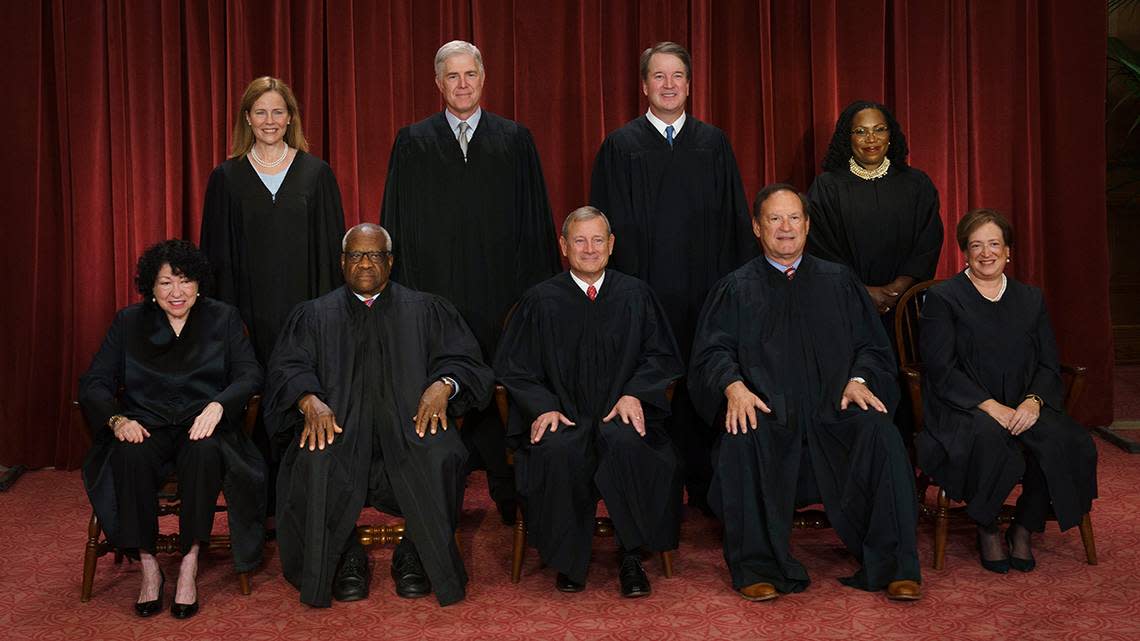Presidents may be immune from prosecution, but the people can still vote them out | Opinion

- Oops!Something went wrong.Please try again later.
It is not surprising that the U.S, Supreme Court, in Monday’s surprising decision, vests absolute immunity on a president, in this case Donald Trump, for what the described as “his official acts.”
The fact that the 6-3 decision shocked some is more a function of the novelty of the ruling, given that no president had ever been charged criminally for conduct during his tenure.
So the question becomes what are unofficial acts; and the answer is not one that flows easily from the Court’s opinion, which begins with the cryptic statement that prescribes “absolute immunity from criminal prosecution for actions within [the President’s] conclusive and preclusive constitutional authority.”
After reading the 119 page decision, here is where we might have to go down a rabbit hole together:
The U.S. Constitution explicitly vests only one of the three branches from liability for official acts; that is the Congress, under the so-called Speech or Debate Clause (Article I, Section 6).
The other two branches, executive and judicial, must rely on principles implicit in the Constitution for their immunity - in particular the idea that there is inherent and inviolable separation of powers among what are considered three “co-equal” branches.
As is the case with congressional immunity, the big question is what constitutes “official acts,” which are protected, and what are what we might call “extracurricular acts” which are not protected.
The distinction is not too different from the one that protects an employee from liability for acting within “the scope of their employment.”
The adjectives “conclusive” and “preclusive,” strung together as if they were proverbial “ham and eggs,” were first used in another Supreme Court opinion dealing with presidential powers. They offer little clarity - at least to my limited mind.
Nor is analysis helped much by the distinction between “absolute immunity,” as pertains what are clearly a president’s “core constitutional powers,” and a mere “presumptive immunity” that attaches to his “remaining official actions.”
That distinction, I should add, is very similar to the one that applies to defamation actions, in which some receive “absolute immunity” and some merely “qualified immunity.”
So I kept on wading through the lengthy opinion, and I want to share with you two significant quotes - one from the majority opinion and one from the minority - that might shed light on what is an official act and what is not.
From the majority:
“[T]he President must be immune from prosecution for an official act unless the government can show that applying a criminal prohibition to that act would pose no ‘dangers of intrusion on the authority and functions of the Executive Branch.’”
The above just begs the question, rather than answering it. It leaves to the lower court, for example, determining whether you can prosecute a former president for using the power of his office to instigate criminal acts by others, or if he can try to convince the governor of a state to meddle with election tallies.
For the minority of the Court, it gives the impression that outrageous acts, which are done within the president’s powers as Commander-in-Chief, would be immune. Here’s Justice Sonia Sotomayor with some rather shocking examples:
“When he [the President] uses his official powers, under the majority’s reasoning, he now will be insulated from criminal prosecution. Orders the Navy’s Seal Team 6 to assassinate a political rival? Immune. Organizes a military coup to hold onto power? Immune. Takes a bribe in exchange for a pardon? Immune, Immune, Immune, Immune.”
That’s one too many “Immunes” and makes me think, like Shakespeare, that “the lady doth protest too much.”
The counter to that argument is, rather, that the president can be impeached at any time for such conduct, and that once removed, he can be tried for any and all of those.
In 1974, President Richard Nixon was forced to resign from office for acts during the Watergate investigation which could be considered lesser transgressions than those of Trump. Nixon was saved from spending time in jail by his successor’s pardon.
Again, what counts in our Constitutional scheme is that we have three vibrant, independent branches, ready at all times to curb the excesses of the other two.
And, of course, that the people exercise their right to vote into or out of office any elected official who abuses his power.
Xavier L. Suarez is a practicing attorney and graduate of Harvard Law School and the Kennedy School of Government at Harvard. He has taught state and local government law at St. Thomas University Law School and served as mayor of Miami (1985-93) and Miami-Dade Commissioner (2011-2020) Coincidentally, one of Suarez’s law professors, Philip Heymann, was chosen by Archibald Cox as his deputy for the independent counsel investigation into Watergate.

